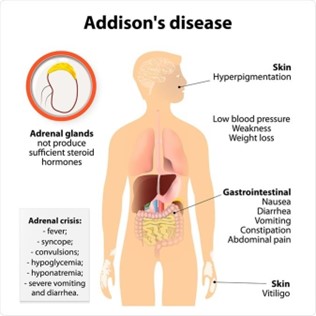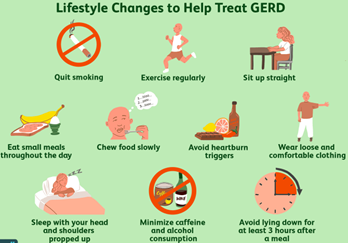A patient is admitted to the hospital in Addisonian Crisis a month after a diagnosis of Addison’s disease. The nurse identifies the nursing diagnosis of ineffective therapeutic regimen management related to lack of knowledge of management of the condition when the patient says:
“I double my dose of hydrocortisone on the days that I go for a run.”
“I had the stomach flu earlier this week and couldn't take the hydrocortisone.”
“I frequently eat at restaurants, and so my food has a lot of added salt."
“I do yoga exercises almost every day to help me reduce stress and relax.”
The Correct Answer is B
The statement "I had the stomach flu earlier this week and couldn't take the hydrocortisone" indicates that the patient may not be adhering to their prescribed medication regimen, which can lead to an Addisonian crisis. Therefore, the nursing diagnosis of ineffective therapeutic regimen management related to lack of knowledge of management of the condition is appropriate.
Addison’s disease is a condition in which the adrenal glands do not produce enough cortisol and aldosterone. Hydrocortisone is a glucocorticoid medication that is often used to replace the cortisol that the adrenal glands are not producing. In the Addisonian crisis, the body is unable to produce the necessary levels of cortisol and aldosterone, which can lead to potentially life-threatening complications such as hypotension, dehydration, and electrolyte imbalances.
The other statements may indicate areas where patient education is needed, but they do not directly relate to the immediate risk of an Addisonian crisis.

Nursing Test Bank
Naxlex Comprehensive Predictor Exams
Related Questions
Correct Answer is C
Explanation
When teaching a patient with newly diagnosed GERD, the nurse will include that they will need to keep the head of their bed elevated on blocks. This helps prevent stomach acid from flowing back into the esophagus while sleeping.
Peppermint tea might not be helpful in reducing GERD symptoms as it can relax the lower esophageal sphincter and worsen reflux.
Eating between meals is not recommended as it can increase acid secretion. Vigorous physical activities may increase the incidence of reflux.

Correct Answer is A
Explanation
Based on the given arterial blood gas results, the patient's pH is elevated, indicating alkalosis. The PaCO2 level is decreased, which suggests respiratory compensation. The bicarbonate (HCO3-) level is within the normal range. Therefore, the interpretation of the arterial blood gas results is respiratory alkalosis.
Whether you are a student looking to ace your exams or a practicing nurse seeking to enhance your expertise , our nursing education contents will empower you with the confidence and competence to make a difference in the lives of patients and become a respected leader in the healthcare field.
Visit Naxlex, invest in your future and unlock endless possibilities with our unparalleled nursing education contents today
Report Wrong Answer on the Current Question
Do you disagree with the answer? If yes, what is your expected answer? Explain.
Kindly be descriptive with the issue you are facing.
